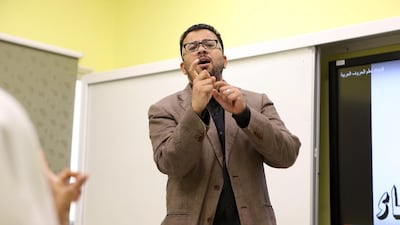Sign language interpreter Wael Kamel has made it his life's goal to help hearing-impaired people assimilate with the rest of the society after seeing his deaf father mistreated.
SHARJAH // Sign language interpreter Wael Kamel is on a mission to help the hearing-impaired assimilate with the rest of the community.
Although he is not deaf, the 39-year-old Egyptian was born to deaf parents.
So, he learnt how to communicate with his parents even before he spoke Arabic.
He grew up communicating with them through his grandmother, who helped take care of him in the early years of his life until he learnt the basics of sign language.
“Sign language was the first language I learnt, and I had to, to communicate with my parents, and it was not easy,” says Mr Kamel, a father of two.
He earned his university degree in commerce and then took courses for two years to improve his sign-language skills.
“It was evident for me how hard it was for deaf people to reach out and carry the simplest of tasks that required interaction with the public,” he says.
He puts his desire to help people down to an occasion when he accompanied his father to a government department in Cairo.
“The employee looked at my father and made a remark that it was hard to deal with normal people and now he had to deal with the deaf, too.”
Mr Kamel says his father looked at him and said that if there were sign-language translators available, the hearing impaired would not suffer from such discrimination.
“That incident left a negative impression on me, and I had to do something about it,” Mr Kamel says.
He then worked in a government organisation that helps the hearing-impaired in Egypt, eventually becoming a board member.
The organisation pushed for sign-language interpretation on television channels, and Mr Kamel worked for a network.
These jobs, however, were not as fulfilling as he had hoped.
“It helped a lot of deaf individuals to watch those channels, but I wanted to bridge the gap and help the deaf community more,” he says.
In 2009, he moved to the UAE and now works at the Sharjah City for Humanitarian Services organisation as a sign-language coach and interpreter for children.
“I teach students and teachers sign language so that they can learn how to communicate with each other and with their communities,” Mr Kamel says.
He says it is incredibly rewarding when one of his pupils overcomes disabilities and manages to reach higher education.
“A female student of ours finished school here, and graduated from university and now she works with us at Sharjah City,” he says.
tzriqat@thenational.ae

